
Perry County is a county located in the southeastern portion of the U.S. state of Missouri. As of the 2020 census, the population was 18,956. Its county seat is Perryville. The county was officially organized on November 16, 1820 from Ste. Genevieve County and was named after Oliver Hazard Perry, a naval hero of the War of 1812.

Perryville is a city in Perry County, Missouri, United States. The population was 8,555 at the 2020 United States census. Perryville is the county seat of Perry County.
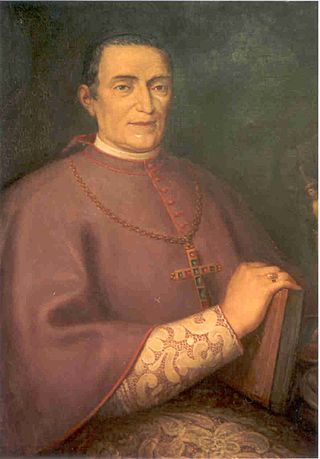
Joseph Rosati, CM was an Italian-born Catholic missionary to the United States who served as the first Bishop of Saint Louis from 1826 to 1843. A member of the Congregation of the Mission, in 1820 he was appointed provincial superior over all the Vincentians in the United States.

Louis William Valentine DuBourg was a French Catholic prelate and Sulpician missionary to the United States. He built up the church in the vast new Louisiana Territory as the Bishop of Louisiana and the Two Floridas and later became the Bishop of Montauban and finally the Archbishop of Besançon in France.
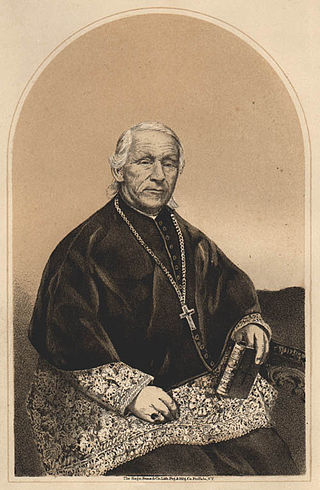
John Timon, C.M. was a prelate of the Roman Catholic Church. He served as the bishop of the new Diocese of Buffalo in Western New York and founder of the brothers of the Holy Infancy religious order.

Michael Domenec, DD, C.M. full name Miquel Joan Josep Domènech i Veciana, was a Spanish prelate of the Roman Catholic Church. He served as the second bishop of the Diocese of Pittsburgh in Pennsylvania from 1860 to 1876 and as the only bishop of the short-lived Diocese of Allegheny in Pennsylvania from 1876 to 1877.

Jean-Marie Odin, C.M. was a French-born prelate of the Catholic Church and a member of the Congregation of the Mission. He served as the second Archbishop of New Orleans from 1861 to 1870.

Leo-Raymond de Neckère, C.M., was a Belgian-born prelate of the Roman Catholic Church who served as Bishop of New Orleans from 1830 until his death in 1833.

Old St. Ferdinand Shrine and Historic Site is located at no. 1 rue St. Francois, Florissant, Missouri, and is owned, preserved, maintained, and protected by the non-profit organization, Friends of Old St. Ferdinand, Inc. The Shrine and Historic Site consists of four historic buildings on their original locations: the 1819 convent, 1821 church, 1840 rectory, and 1888 schoolhouse.
St. Vincent's Seminary and College, also known as St. Vincent's College and "The Cape", was an educational facility in Cape Girardeau, Missouri, which had two components: a college, providing a secular education of young men of the region; and a seminary, for the training of candidates for the Catholic priesthood to serve in the Midwestern United States. The school was operated by the priests of the Congregation of the Mission, commonly referred to as the Vincentians, as a part of their mission since their founding in 17th-century France by St. Vincent de Paul. It operated from 1838 to 1979.

Mary Immaculate Seminary was a Catholic seminary in Northampton, Pennsylvania. It opened in 1939 to train candidates for the Congregation of the Mission, commonly called the Vincentian Fathers, and operated until 1990. The facilities then served as a retreat center. The property was listed on the National Register of Historic Places in 2022.
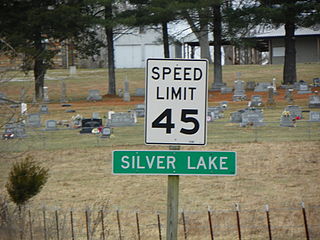
Silver Lake is an unincorporated settlement in Saint Mary's Township in Perry County, Missouri, United States.
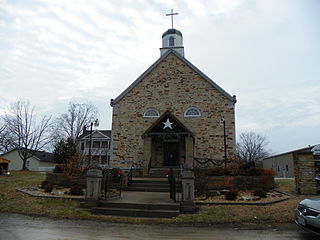
St. Maurus Church is parish of the Roman Catholic Church in Biehle, Missouri, USA, within the deanery of Ste. Genevieve of the Archdiocese of St. Louis.

St. Vincent de Paul Church is a Roman Catholic church in Perryville, Missouri. It was completed in 1965, but has roots in a Catholic community that built its first church in Perryville in 1817.

St. Boniface Parish Church and Parish was a Roman Catholic church in Perryville, Missouri.

The Nativity of the Blessed Virgin Mary Church was a Roman Catholic church in Belgique, Missouri.

St. Rose of Lima Mission is a Roman Catholic church in Silver Lake, Missouri, in the deanery of Ste. Genevieve of the Archdiocese of St. Louis. It is administered by the Vincentians as a mission of St. Vincent de Paul Church in Perryville; as with the churches of St. James and St. Joseph, there are no weekend Masses offered.
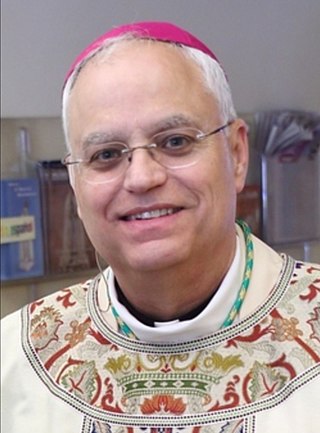
Andrew Eugene Bellisario is an American Catholic prelate who served as Archbishop of Anchorage-Juneau since 2020, as Bishop of Juneau from 2017 to 2019 and as apostolic administrator of the former Archdiocese of Anchorage for almost a year. He is a member of the Congregation of the Mission.
Francesco (Francis) Cellini was a member of the Vincentian Order of priests connected to mission work serving the mid-western section of the United States during the mid-1800s. Cellini was born in the province of Ascoli Piceno, Marche Region, Italy. By 1818 he was the chaplain of the Hospital Santo Spirito in Rome in the Rione neighborhood near Vatican City. That same year he was accorded the habit of the Vincentian Order. After serving in Louisiana, Missouri, and Illinois, Cellini's ministerial work concluded with a posting in St. Louis, where he was made Vicar General of the St. Louis Diocese.
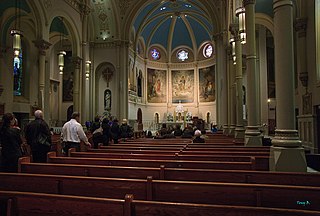
The Basilica Shrine of Our Lady of the Miraculous Medal, formerly known as The Miraculous Medal Shrine, is at 500 E. Chelten Ave. in the East Germantown neighborhood of Philadelphia, Pennsylvania. The church now known as the Basilica Shrine was completed by the Congregation of the Mission in 1879 as the Chapel of the Immaculate Conception on the grounds of St. Vincent's Seminary. In 1927, Fr. Joseph Skelly, CM, commissioned the creation of Mary's Central Shrine within the chapel to promote devotion to Our Lady of the Miraculous Medal, a title of the Virgin Mary originating with her apparitions to Saint Catherine Labouré in Paris in 1830.



































